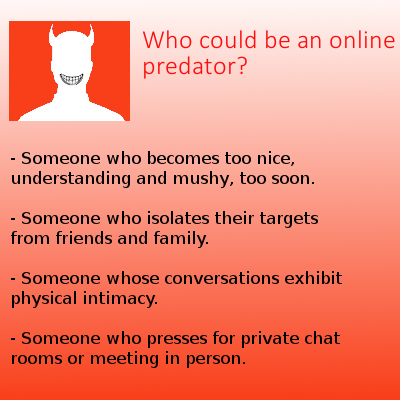How to Recognize the Signs of Online Predators?
The internet has revolutionized the way we connect, learn, and entertain ourselves, but it has also created new dangers – one of the most alarming being online predators. These individuals use social media, gaming platforms, and chat rooms to manipulate, exploit, and harm unsuspecting victims, particularly children and teenagers. Understanding how online predators operate is the first step in safeguarding your family.
In this blog, we’ll explore the warning signs of predatory behavior, common tactics used to gain trust, and practical steps you can take to protect your loved ones.
Signs of an Online Predator
Online predators use manipulation and deceit to exploit victims, often targeting children and vulnerable individuals. Recognizing warning signs can help prevent harm and ensure online safety.
1. A sudden out of the blue ‘Hi’ is not harmless. But a ‘Hi’ followed by questions about your kid’s gender, school and home address, should be taken for signs of an online predator.
2. Online predators are one the nicest people on Earth, Mars, Venus, and probably every planet. They pretend to have the most attentive ear. They agree to almost everything their victims have to say.
3. Such criminals overwhelm their targets with ‘undivided attention’, affection, sympathy and sometimes, even expensive gifts.
4. Sexual predators turn a normal conversation into physical intimacy. They serve their victims with explicit images, videos and convince them to get indulge in cybersex.
5. Once a sexual predator has successfully established their connection with their victim, they will try to coax the other person into a more private space like instant messaging, SMS, and telephone call to name a few.
6. Predators also persuade their victims to meet them in person; in most cases, for sex.
7. They seem to get too friendly and too mushy only after a few chats. They pretend to be the knight in shining armor who has come to dispel the darkness from their victim’s world.
8. A very important characteristic feature of any online predator is their attempt to turn the victim against their family and friends. The criminal would somehow manipulate the victim into thinking that their family do not understand them or care about them. This is a potent trick that predators use especially on teenagers who are lonely, socially inactive, sexually confused, have few or no friends, or going through an emotional loss or pain.
9. Experienced online predators do not just go looking for their victims online. They do a thorough homework before going for the kill. It may happen that your kid’s online buddy knows things about them that they have not made public or told anyone.
Common Targets of Online Predators
Children who were abused in their early lives.
Children who have few or no friends, socially inert or face challenges in getting along with their peers.
Kids raised by single parents.
Children who usually expect rewards (monetary or otherwise) for their cooperation.
Children with low self-esteem, low self-confidence and those who kept getting bullied.
Signs That a Child is Being Groomed Online
Key signs of online grooming include:
Sudden secrecy about online activities, forming new relationships with unknown individuals
Reluctance to share details and noticeable mood or behavior changes
They may also spend excessive time online, hide their screens, or become withdrawn
Monitoring online activity and maintaining open communication are crucial to ensuring their safety.
How Parents can help Kids Stay Safe from Online Predators
It goes without saying that, parenthood is the most powerful weapon you have to help your children build a better world for themselves. But given the growth of technology, a little awareness and education on cyber safety does not harm. Here’s are some steps we recommend you to take:
1. Speak, talk, communicate! There is nothing like a healthy communication between you and your kids. Without getting too nosy, just try to know what their online world is like.
2. Help them identify the bad people online; what does the term ‘online predator’ mean, what kind of dangers lurk on the Internet, etc.
3. Let them know that they can approach you about anything they come across on the Internet, good or bad (bad, especially).
4. Tell them that discussing their issues with an older sibling, a close friend or you is more helpful than posting them online.
5. Encourage your children to post age-appropriate content over social networking platforms.
6. Help them realize the risks behind posting their personal information (gender, name, address, phone number, etc.) publicly. This post talks about all such risks.
7. Letting your children access the computer and the Internet in their bedrooms, may not be a good idea. Place it in a family room. This will discourage them into resorting to risky behaviors such as webcam chats. Such measures also deter predators as they become less capable of manipulating their targets.
8. Helping your kids realize online dangers is one thing and putting them into a water-tight compartment is another. Children have their own private world; the sense of privacy is even greater in teenagers. So, you have to handle this smartly. Parental control tools are built with the intention of online safety for kids. With these tools you can block inappropriate websites, and decide when and how much your kids can use the Internet. Quick Heal parental control offers all these essential features.
Who to contact about online predators
If you encounter an online predator in India, report it immediately to local law enforcement or cybercrime units. You can file a complaint through the National Cyber Crime Reporting Portal (www.cybercrime.gov.in) or contact the Cyber Crime Helpline (1930). Social media platforms and gaming sites also have reporting tools for suspicious activity. Parents and children should reach out to trusted adults, school counselors, or organizations like Childline India (1098) and the National Commission for Protection of Child Rights (NCPCR) for guidance and support. Reporting promptly can help prevent further harm and ensure online safety for all.
Conclusion
Recognizing the key signs of online predators and cyber grooming is essential in protecting children from digital threats. Rather than reacting with judgment to any inappropriate online behavior, it’s important to approach these situations with understanding and guidance. Children may make mistakes, but each incident presents an opportunity for learning and growth.
By fostering open communication, setting clear boundaries, and educating them about online safety, parents can empower their children to navigate the internet responsibly. Staying vigilant, utilizing parental controls, and encouraging critical thinking will help create a safer online environment. Together, we can turn challenges into valuable lessons and ensure a secure digital future. Stay informed, stay proactive, and most importantly, stay safe!


1 Comment
Really good info Rajib sir,
Thanks & Regards,
Hrushi.